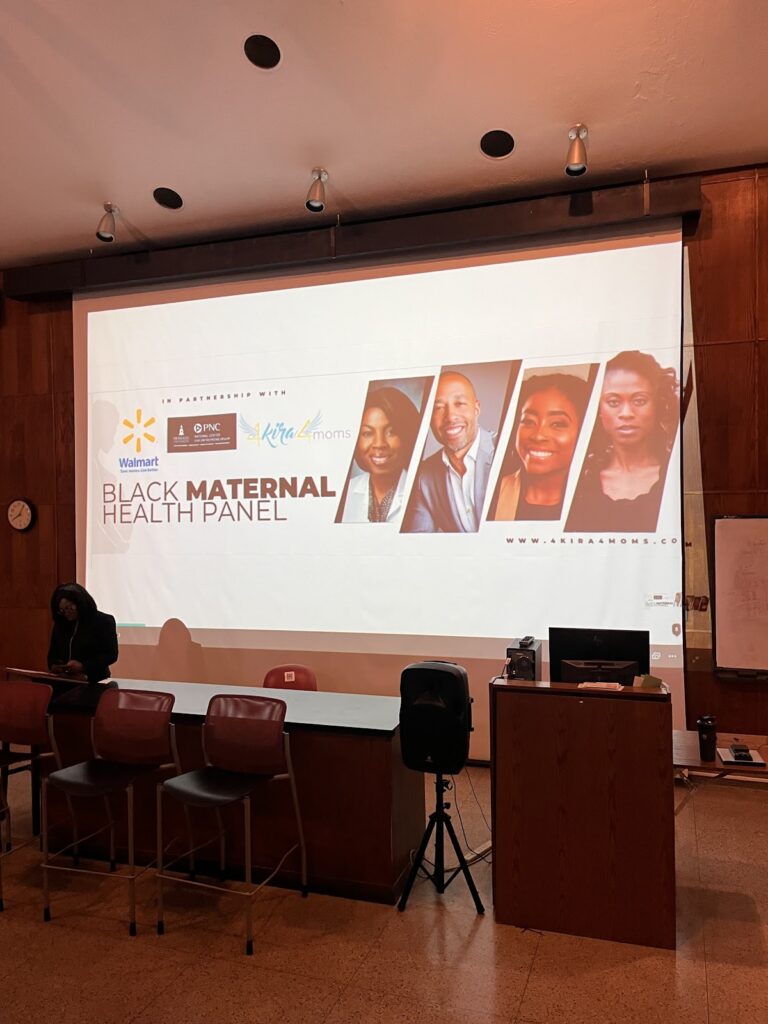
With Black women facing higher maternal mortality rates than other demographics in America, according to the CDC, Howard University’s Black Maternal Health Panel held last week, discussed the need for systemic health care reforms.
The Black Maternal Health Panel, held at Howard’s College of Medicine auditorium during Congressional Black Caucus Week, brought together healthcare advocates and professionals for a discussion. Panelists and student attendees emphasized that while awareness remains essential, it is time to take concrete steps to improve health care outcomes for Black mothers.
Charles Johnson, founder of 4Kira4Moms, shared his journey into advocacy following the death of his wife, Kira Dixon Johnson, during childbirth. She was a patient at Cedars-Sinai, a popular Los Angeles hospital for celebrities, while giving birth to her second son.
After delivering her child, she was experiencing excruciating abdominal pain for over 10 hours, despite her husband continuously asking for a CT scan to be taken. When the medical staff determined that she needed surgery she suffered from a hemorrhage, causing three and a half liters of blood to fill her abdomen, and died.
Initially focused on raising awareness, Johnson shifted his approach after realizing that he was unintentionally instilling fear in Black women regarding childbirth.
“Instead of promoting healthier birthing experiences, I was scaring women away from having children,” he said.
Johnson now focuses on working towards health care accountability and creating solutions that support Black women throughout their birthing process.
Angelina Spicer, a 2023 Howard graduate, comedian and founder of Spicey Moms, a global grassroots initiative dedicated to providing vital support to mothers in underserved communities, became an advocate after her own struggle with postpartum depression.
Postpartum depression usually comprises strong feelings of sadness, anxiety and tiredness that last for an extended time after giving birth.
After giving birth to her daughter, she felt “overwhelmed” and “unqualified” for motherhood and was eventually admitted to a psychiatric facility for 10 days.
Spicer explained that her experience, and the lack of follow-up care from her health care providers, prompted her to use her comedic voice to normalize discussions about postpartum mental health and to advocate for legislative support for Black mothers.
“Nobody I knew openly spoke about postpartum depression,” she said.
She now uses platforms like Instagram and TikTok to raise awareness.
“I want mothers who have just given birth to know that they are not alone,” Spicer said.
Alicia Butler, health equity director and program and policy liaison for the National Action Network, a civil rights organization, addressed the need to approach Black maternal health through a civil rights framework.
She is passionate about “finding ways to reach health care deserts” and making care accessible to all women, but especially Black women, who are pregnant, giving birth, and postpartum.
She is also a doula and wants to find more ways to help Black women through the birthing process in her personal life.
“I learned about the Black maternal health crisis and I was mortified,” Butler said. “I realized that we need to focus on a reproductive justice lens instead of so much of a reproductive freedom lens because, as a civil rights organization, it’s important to acknowledge that race is a factor before we can get to anything else.”
According to the CDC, Black women are at least three times more likely to die due to a pregnancy-related cause when compared to White women.
Four studies conducted by the CDC in 2022 also determined that several social factors like historical exposure to racism and discrimination have created an implicit bias within the healthcare system–impacting the quality of medical care that Black women may be treated with while carrying and delivering their children.
Howard students in attendance shared their reflections on the panel.
Chelsea Hagan, a freshman nursing major from Richmond, Virginia, said she was deeply affected by Johnson’s account of the hours his wife went unattended in the hospital.
“It made me want to become a healthcare provider who stands up for my patients and advocates for what they need,” Hagan said.
During the panel discussion, Johnson mentioned that he walked into the hospital, thinking he knew everything necessary about the birthing process, but after his wife died, realized that he was less educated than he thought.
This was Hagan’s largest takeaway, as she now has a deeper commitment to ensuring that fathers are as knowledgeable as possible while their partners are pregnant and preparing to deliver a child.
“I want to make sure both parents are fully informed and engaged,” she said.
Freshman nursing major Kandice Withers from Charlotte, North Carolina, found the panel inspiring.
She shared that Johnson’s story resonated with her, highlighting the role fathers play in the postpartum process.
“I learned how important a father figure is in the birthing process and postpartum period,” Withers said. The event reinforced her desire to create her own midwifery clinic one day.
Zoey Hall, a sophomore computer science major and maternal and child health minor from St. Louis, Missouri attended the Black Maternal Health Panel to deepen her understanding of the crisis.
With personal ties to the issue, her aunt died during childbirth, Hall is developing a device to help those in health care deserts connect with birthing workers.
Hall was also recently accepted into the fall 2024 Women’s Business Enterprise National Council WOC Incubator at Howard, where she’s excited to build a business plan for her device.
“It was a great opportunity to learn more about the Black maternal health crisis and non-profit work,” she said, highlighting the event’s impact on her efforts to address healthcare disparities.
This panel was moderated by Dr. Shari Lawson, associate professor and chair department of ObGYN at the Howard College of Medicine and at the end, remarks were given by the first woman dean of the Howard College of Medicine, Dr. Andrea Hayes Dixon.
Copy edited by Camiryn Stepteau









